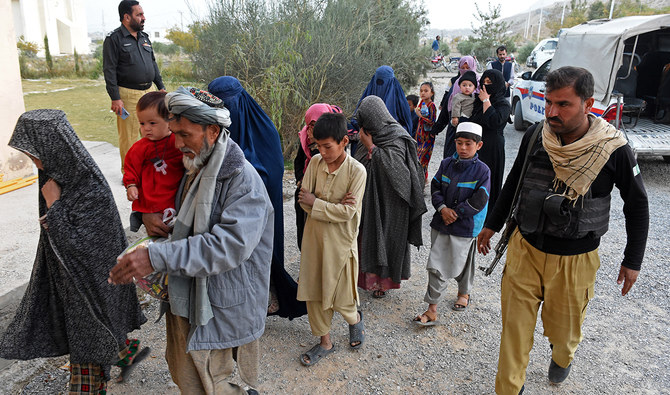ISLAMABAD: Pakistani security forces on Wednesday detained and deported dozens of Afghans who were living in the country illegally, after a government-set deadline for them to leave expired, authorities said.
The sweep is part of a new anti-migrant crackdown that targets all undocumented or unregistered foreigners, according to Islamabad, though it mostly affects some 2 million Afghans in Pakistan without documentation.
The crackdown has drawn widespread criticism from UN agencies, rights groups and the Taliban-led administration in Afghanistan.
Pakistan’s interim interior minister confirmed that the deportations have begun.
“Today, we said goodbye to 64 Afghan nationals as they began their journey back home,” Sarfraz Bugti wrote on X, formerly known as Twitter. “This action is a testament to Pakistan’s determination to repatriate any individuals residing in the country without proper documentation.”
UN Secretary-General Antonio Guterres is “very concerned about this forced movement of people” and would like Pakistan “not to go through with this,” UN spokesman Stephane Dujarric said Wednesday.
Sending many Afghans who “are very likely refugees to a country that by most accounts isn’t ready to welcome them back,” and faces a dire humanitarian situation and serious human rights issues, including the Taliban’s crackdown on women and girls who are only allowed an elementary education, shouldn’t continue, Dujarric said.
The authorities said Wednesday’s sweeps took place in the port city of Karachi, the garrison city of Rawalpindi, and in various areas in the southwestern Baluchistan and northwestern Khyber Pakhtunkhwa provinces, which border Afghanistan.
The crackdown has worried thousands of Afghans in Pakistan waiting for relocation to the United States under a special refugee program since fleeing the Taliban takeover. Under US rules, applicants first had to relocate to a third country — in this case Pakistan — for their cases to be processed. Most of those awaiting relocation had worked for the US government, non-government organizations and media organizations in the years before the Taliban returned to power and they fled fearing persecution at home. The Taliban-led administration later announced an amnesty, encouraging Afghans to come back.
On Tuesday, a US official said Washington’s priority was to facilitate the safe and efficient resettlement and relocation of more than 25,000 eligible Afghans in Pakistan to the US
On Wednesday, three Pakistani officials confirmed that Islamabad received the list of such Afghans, but they said the list “was flawed and contained incomplete information.” The officials said the list was subsequently withdrawn by the US officials to review and revise it before sending it again after Pakistan sought more clarity.
The officials spoke on condition of anonymity as they were not authorized to speak on the record.
There was no immediate response from the US Embassy about it.
On Tuesday, thousands of Afghans had crammed into trucks and buses and headed to the two key border crossings to return home to avoid arrest and forced deportation.
According to the UN agencies, there are more than 2 million undocumented Afghans in Pakistan, at least 600,000 of whom fled after the Taliban takeover in 2021.
Human Right Watch on Tuesday accused Pakistan of resorting to “threats, abuse, and detention to coerce Afghan asylum seekers without legal status” to return to Afghanistan. The New York-based watchdog appealed for authorities to drop the deadline and work with the UN refugee agency to register those without papers.
In Afghanistan, Zabihullah Mujahid, the main spokesman for the Taliban government expressed concerns over forced expulsion of Afghans, saying that the past 45 years of wars and conflict in Afghanistan had forced millions to migrate.
The Afghan migrants have not created any problems in their host countries, he added. Without naming Pakistan, he urged host countries “to stop forcefully deporting Afghan refugees” and practice “tolerance based on Islamic and neighborly manners.”
Mujahid said that all Afghans who are in exile “due to political concerns” are welcome back and that the Taliban will provide a “secure environment in Afghanistan” for all.
Late Tuesday, a Taliban delegation traveled from the capital of Kabul to eastern Nangarhar province to find solutions for returning Afghans. Ahmad Banwari, the deputy provincial governor, told local media that the authorities are working hard to establish temporary camps.
Afghan returnees with families that have nowhere to go can stay in the camps for a month until they find a place to live, Banwari said.
Relations between Pakistan and Afghanistan’s Taliban-led administration have become strained over the past two years because of stepped-up attacks by the Pakistani Taliban, a separate militant group that is allied with the Afghan Taliban.
The Pakistani Taliban, known as Tehrik-e-Taliban Pakistan or TTP, have found safe havens in neighboring Afghanistan, from where they sneak across the volatile border to launch deadly attacks on Pakistani forces.
Since the government deadline was announced on October 3, more than 200,000 Afghans have returned home from Pakistan.
Pakistan has said the deportations would be carried out in a “phased and orderly” manner and those detained during the crackdown would be treated nicely. However, authorities on Tuesday demolished several mudbrick homes of Afghans on the outskirts of Islamabad to force them to leave the country.


















